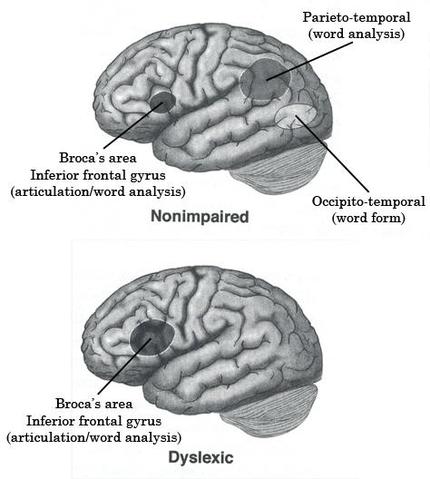
So what exactly is dyslexia? Well, first off, it is important to understand that dyslexia is NOT an intellectual disability.
Dyslexia is a language-processing difference that has nothing to do with IQ. In fact, someone who is dyslexic is also usually gifted in some other area. It is a learning difference that manifests primarily as a difficulty with written language, particularly with reading and spelling. It is genetic, and is separate and distinct from reading difficulties resulting from other causes, such as a non-neurological deficiency with vision or hearing, or from poor or inadequate reading instruction. It does not result from vision or hearing problems. It is not due to mental retardation, brain damage, or a lack of intelligence. In fact anyone with a dyslexic child will know, these kids are brighter and smarter than most children their age. Their intelligence sparkles in their eyes. |
That's part of the definition of dyslexia - these children are gifted and highly superior in certain areas, but struggle more than most when it comes to written language, reading and spelling.
Research suggests that this disability is now prevalent in one out of every five children in the United States. Dyslexia can go undetected in the early grades of schooling. The child can become frustrated by the difficulty in learning to read, and other problems can arise that disguise dyslexia. The child may show signs of depression and low self-esteem. Behavior problems at home as well as at school are frequently seen. The child may become unmotivated and develop a dislike for school. The child's success in school may be jeopardized if the problem remains untreated. The sooner dyslexia is treated, the more favorable the outcome; however, it is never too late for people with dyslexia to learn to improve their language skills. If you feel you or your child may have dyslexia, click here to read about the warning signs of dyslexia. Watch this FREE ONLINE VIDEO with detailed information on dyslexia. |
Brain ResearchDyslexia is caused by an impairment in the brain's ability to translate images received from the eyes or ears into understandable language.
For those out there who say dyslexia is a "myth", research has proved that the brain structure of someone with dyslexia is different from someone without it. This difference occurs mainly in the language processing areas of the brain. In a regular reader, three areas of the brain light up while language processing occurs. In the dyslexic brain, only one area lights up. (Image on the right, taken from the book by Sally Shaywitz called Overcoming Dyslexia) HOWEVER, groundbreaking research has now proved - with three years of tutoring using an Orton-Gillingham method, consistently twice a week, the other two areas of the brain actually get activated and so reading, writing and spelling CAN be remedied, if they are due to dyslexia. |
Can individuals Who are Dyslexic learn to read?
|
YES they can!
Consistent research shows that programs utilizing multi-sensory structured language techniques such as the Orton-Gillingham method DO help children and adults struggling with dyslexia to learn to read and spell. According to the International Dyslexia Association (IDA), if children who are dyslexic get effective phonological training in their early years, (kindergarten and 1st grade), they will have significantly fewer problems in learning to read at grade level than do children who are not identified or helped until 3rd grade. |
74% of the children who are poor readers in 3rd grade remain poor readers in the 9th grade. Often they can't read well as adults either.
It is never too late for individuals with dyslexia to learn to read, process and express information more efficiently. In fact, teenagers and adults often make the best students, because they have suffered the emotional scars of going through many years with this difficulty, that their peers seemed to have no problem with. So if they are offered a program that is proven to work, they are more eager to learn and apply it than six year olds are, because they can start to see the difference in their own abilities and it can be an empowering and life-changing experience. |
Other Resources
Click here to read more about dyslexia: Bright Solutions for Dyslexia
Click here for more information on the solution: Orton-Gillingham Method (Barton Tutoring)
Bright Solutions for Dyslexia has free online videos that contain in-depth warning signs and information on the appropriate intervention required that will help someone with dyslexia the first time around, instead of being sent from pillar to post with no apparent progress in your child's language skills.
If you are looking for signs (in a text version) click here.
Click here to watch FREE VIDEOS on dyslexia, that give detailed information on dyslexia by an expert in the field.
Click here for more information on the solution: Orton-Gillingham Method (Barton Tutoring)
Bright Solutions for Dyslexia has free online videos that contain in-depth warning signs and information on the appropriate intervention required that will help someone with dyslexia the first time around, instead of being sent from pillar to post with no apparent progress in your child's language skills.
If you are looking for signs (in a text version) click here.
Click here to watch FREE VIDEOS on dyslexia, that give detailed information on dyslexia by an expert in the field.
"Research shows that one out of every five children in the United States are dyslexic”


